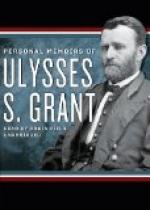The ten regiments which had volunteered in the State service for thirty days, it will be remembered, had done so with a pledge to go into the National service if called upon within that time. When they volunteered the government had only called for ninety days’ enlistments. Men were called now for three years or the war. They felt that this change of period released them from the obligation of re-volunteering. When I was appointed colonel, the 21st regiment was still in the State service. About the time they were to be mustered into the United States service, such of them as would go, two members of Congress from the State, McClernand and Logan, appeared at the capital and I was introduced to them. I had never seen either of them before, but I had read a great deal about them, and particularly about Logan, in the newspapers. Both were democratic members of Congress, and Logan had been elected from the southern district of the State, where he had a majority of eighteen thousand over his Republican competitor. His district had been settled originally by people from the Southern States, and at the breaking out of secession they sympathized with the South. At the first outbreak of war some of them joined the Southern army; many others were preparing to do so; others rode over the country at night denouncing the Union, and made it as necessary to guard railroad bridges over which National troops had to pass in southern Illinois, as it was in Kentucky or any of the border slave states. Logan’s popularity in this district was unbounded. He knew almost enough of the people in it by their Christian names, to form an ordinary congressional district. As he went in politics, so his district was sure to go. The Republican papers had been demanding that he should announce where he stood on the questions which at that time engrossed the whole of public thought. Some were very bitter in their denunciations of his silence. Logan was not a man to be coerced into an utterance by threats. He did, however, come out in a speech before the adjournment of the special session of Congress which was convened by the President soon after his inauguration, and announced his undying loyalty and devotion to the Union. But I had not happened to see that speech, so that when I first met Logan my impressions were those formed from reading denunciations of him. McClernand, on the other hand, had early taken strong grounds for the maintenance of the Union and had been praised accordingly by the Republican papers.




